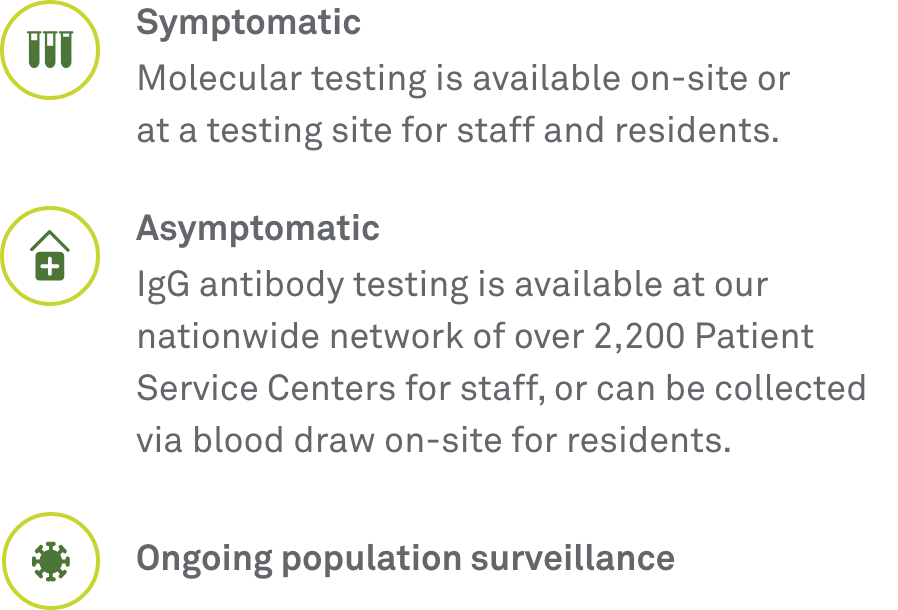

Helping you, your staff, and your residents make more informed decisions about COVID-19
The COVID-19 pandemic has had a devastating impact on nursing homes and long-term care facilities across the country. As parts of the country look to open up and consider loosening restrictions on visitors and activities in facilities, it is essential that we protect the health of residents and staff, and minimize their risk of and exposure to COVID-19.
Quest Diagnostics COVID-19 testing solutions for long-term care facilities combine SARS-CoV-2 (COVID-19) molecular testing for active infection and immunoglobulin (IgG) antibody testing for prior exposure to provide insights into a person’s COVID-19 status, and rapid antigen testinga as an ongoing population surveillance tool.
Our COVID-19 testing solutions can help you implement a customized, turnkey program to help your staff and residents feel more confident about managing their COVID-19 exposure.
a The rapid antigen test is intended for surveillance purposes, and is not intended for screening or diagnostic uses that are subject to FDA regulation. This test should be used at a population-based level and should not be used by healthcare providers for individual patient care.
Contact us to begin building your program now
*Indicates a required field
Quest has decades of experience helping long-term care facilities meet their diagnostic testing needs
Here is one suggested model to help staff and residents understand their COVID-19 status with 4 easy steps:

Flexible testing gives you options:

b Centers for Medicare & Medicaid Services (CMS) requires routine testing of staff. Staff testing frequency will be based on the degree of community spread. Residents are required to be tested when there is an outbreak or when residents show symptoms.1
The antibody tests (sometimes known as the serology tests or IgG tests) are intended for use as an aid in identifying individuals with an adaptive immune response to SARS-CoV-2, indicating recent or prior infection. Results are for the detection of SARS-CoV-2 antibodies. IgG antibodies to SARS-CoV-2 are generally detectable in blood several days after initial infection, although the duration of time antibodies are present post-infection is not well characterized. At this time, it is unknown for how long antibodies persist following infection and if the presence of antibodies confers protective immunity. Individuals may have detectable virus present for several weeks following seroconversion. Negative results do not preclude acute SARS-CoV-2 infection. If acute infection is suspected, molecular testing for SARS-CoV-2 is necessary. The antibody test should not be used to diagnose acute SARS-CoV-2 infection. False positive results for the antibody test may occur due to cross-reactivity from pre-existing antibodies or other possible causes.
- The antibody tests and the molecular tests (together “All tests”) have not been FDA cleared or approved;
- All tests have been authorized by FDA under EUAs for use by authorized laboratories;
- The antibody tests have been authorized only for the detection of IgG antibodies against SARS-CoV-2, not for any other viruses or pathogens;
- The molecular tests have been authorized only for the detection of nucleic acid from SARS-CoV-2, not for any other viruses or pathogens; and,
- All tests are only authorized for the duration of the declaration that circumstances exist justifying the authorization of emergency use of in vitro diagnostics for detection and/or diagnosis of COVID-19 under Section 564(b)(1) of the Act, 21 U.S.C. § 360bbb-3(b)(1), unless the authorization is terminated or revoked sooner.
Reference:
1. Interim final rule (IFC), CMS-3401-IFC, additional policy and regulatory revisions in response to the COVID-19 public health emergency related to long-term care (LTC) facility testing requirements and revised COVID-19 focused survey tool. Centers for Medicare & Medicaid Services. Center for Clinical Standards and Quality/Survey & Certification Group. Updated August 26, 2020. Accessed October 19, 2020. https://www.cms.gov/files/document/qso-20-38-nh.pdf